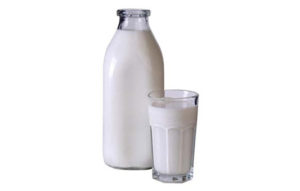 A diet consists of whole foods, either alone or alongside many other foods as part of a meal, not of single nutrients.
A diet consists of whole foods, either alone or alongside many other foods as part of a meal, not of single nutrients.
The nutritional evaluation of the relation between diet and health has traditionally focused on individual food constituents such as proteins, fats, carbohydrates, and micronutrients separately.
Foods have complex structures both physically and nutritionally, which affect digestion and absorption and may generate interactions within the food matrix, thereby altering the bioactive properties of nutrients in ways that are not predictable from the nutrition-label information.
The majority of current dietary guidelines have included dairy products as part of a healthy diet but have recommended the consumption of low-fat or fat-free versions to reduce intake of saturated fat.

Latte
However, it has been questioned whether the current dietary recommendations on dairy consumption have taken full account of the effects of whole foods or if they have relied on extrapolations of health effects of single nutrients that are contained in dairy.
A difficulty in many epidemiologic studies that have examined dairy intake in relation to health has been the broad categorization of dairy foods.
The importance of the dairy matrix on bone health has been studied in 2 trials that compared whole dairy products with dairy nutrients.
Fermented dairy products may have a distinct positive effect on the mineral and bone balance because, in addition to the supply of calcium, phosphorus, and protein, fermented dairy products also contain probiotic bacteria.
These bacteria may alter the gut microbiota and enhance the capacity to translocate calcium across the intestinal epithelium.
A 2-y randomized controlled trial examined the effects of calcium supplements, calcium plus vitamin D supplements, or a dairy product (cheese) on bone mass accrual and body composition in 10- to 12-y-old girls with low habitual calcium intake.
The cheese supplementation resulted in a higher percentage change in the cortical thickness of the tibia than did the placebo, calcium supplementation, or calcium plus vitamin D supplementation.
A per-protocol analysis showed that cheese supplementation resulted in a higher whole-body bone mineral density (BMD) in subjects with >50% compliance.
Thus, cheese had a superior effect on bone mass accrual compared with that of calcium or calcium plus vitamin D supplementation.
Another randomized controlled trial investigated the effect of dairy products or a calcium supplement, both of which provided 1200 mg Ca/d, on markers of bone metabolism and BMD relative to the effects in a control group.
After 12 mo, compared with the calcium-supplement group and the control group, the dairy group had greater improvements in pelvic and spinal densities and total BMD.
Both trials supported a dairy matrix effect on bone health.
Finally, the stimulation of a beneficial gut microbiota, after intake of probiotics, has been suggested to modulate gut function through the regulation of the immune system.
This stimulation has also been discussed to facilitate weight loss or weight maintenance associated with insulin sensitivity.
In conclusion, evidence to date indicates that the dairy matrix has specific beneficial effects on health because the metabolic effects of whole dairy on body weight, cardiometabolic disease risk, and bone health differ from those of single dairy constituents.
Also, different dairy product types seem to be distinctly linked to various health effects and disease risk markers.
In addition, different processing methods and dairy structures can enhance interactions in the dairy matrix, thereby modifying the metabolic effects of dairy consumption.
Therefore, the nutritional value of dairy products should be considered as the biofunctionality of the sum of nutrients within dairy matrix structures.
See also
Enjoying full-fat milk, yogurt, cheese and butter is unlikely to send people to an early grave (2018-09-05)
Link…
Milk polar lipids could reduce cardiovascular risk in overweight postmenopausal women (2019-08-12)
Link…
Mechanism of action of whole milk and its components on glycemic control in healthy young men (2014-10-29)
Link…
For more information
CLINICAL NUTRICION
Whole dairy matrix or single nutrients in assessment of health effects: current evidence and knowledge gaps
Link…
MDN
This post is also available in:
 Italian
Italian


